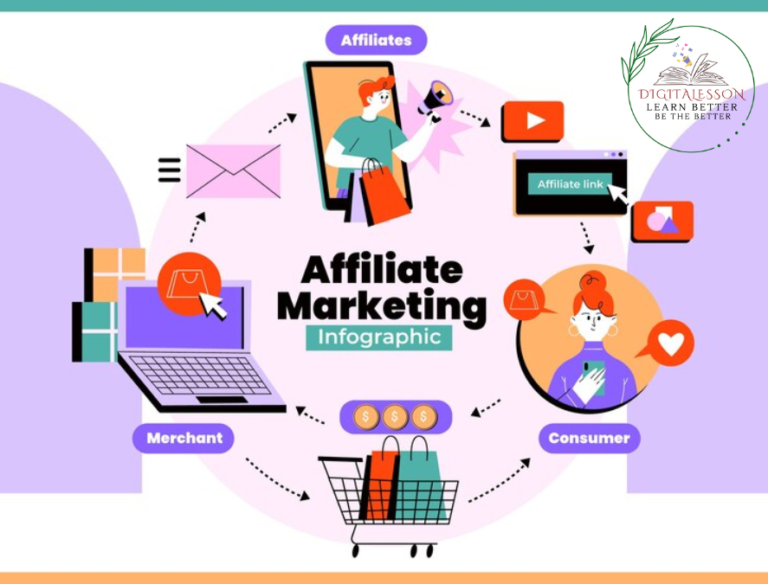Table of Contents
In affiliate marketing, a company collaborates with an affiliate or a group of affiliates to promote its goods or services online. For each sale or conversion generated through the affiliate’s referral link, the business under this model pays the affiliate a commission. Depending on the terms of the agreement between the business and the affiliate, this commission may be a percentage of the sale or a set sum.
Affiliate Marketing Typically Involves Three Parties
The merchant or advertiser, the affiliate or publisher, and the consumer. The merchant creates a product or service and provides a referral link to the affiliate. The promotes the product or service through their website, social media, email marketing, or other channels.
Affiliate’s Referral Link
When a consumer clicks on the affiliate’s referral link and makes a purchase, the affiliate earns a commission. Businesses benefit from affiliate marketing by expanding reach and sales without costly traditional marketing.
By partnering with relevant affiliates, businesses can leverage their audience and expertise to drive more traffic and sales. For affiliates, the benefit of affiliate marketing is that they can earn money by promoting products or services they believe in, without having to create their own products.
Unlocking Profitability: The Power of Affiliate Marketing and Revenue Stream
Affiliates can earn a commission on each sale or conversion made through their referral link, providing an additional revenue stream. To get starting with affiliate marketing, businesses need to make an affiliate program and hire affiliates. This can be done through affiliate networks, which act as intermediaries between businesses and affiliates, or through direct outreach to relevant affiliates. Once the affiliate program is in place, businesses need to provide affiliates with marketing materials such as banners, product images, and promotional copy.
Maximizing Affiliate Marketing Success: Choosing the Right Affiliates and Empowering Them for Effective Product Promotion
Affiliates then promote these products through their website or other marketing channels, using their unique referral link to track sales and commissions. To be successful in affiliate marketing, businesses need to choose the right affiliates and provide them with the resources they need to promote their products effectively. Affiliates, on the other hand, need to have a strong online presence and an engaged audience to drive traffic and sales to the merchant’s website.
Overall
Affiliate marketing is a popular and effective form of digital marketing that allows businesses to reach a wider audience and increase their sales, while providing affiliates with a way to earn money by promoting products they believe in.
By leveraging the power of partnerships and digital marketing, affiliate marketing has become an essential part of the modern marketing mix.
Why is Affiliate Marketing Important?
- Cost-Effective : Affiliate marketing can be a cost-effective way for businesses to promote their products or services. Rather than investing in expensive traditional marketing channels, businesses can leverage the audience and expertise of affiliates to reach a wider audience and increase their sales.
- Wider Reach : By partnering with relevant affiliates, businesses can reach a wider audience than they would be able to on their own. Affiliates often have a large and engaged audience that trusts their recommendations, making them a valuable partner for businesses looking to expand their reach.
- Measurable Results : Affiliate marketing campaigns are highly measurable, with detailed analytics and insights available in real-time. This allows businesses to analyze, monitor and performance to insight and improve ROI by driven data.
- Targeted Advertising : Affiliate marketing allows businesses to target specific demographics and audiences through their partnerships. Affiliates often have a niche audience that aligns with the products or services being promoted, making them a valuable partner for businesses looking to reach a specific market.
- Improved SEO : Affiliate marketing can also help businesses improve their search engine rankings, as affiliates often link to the merchant’s website in their promotional materials. This can help drive more traffic to the merchant’s website and improve their overall online visibility.
Types of Affiliate Marketing

- Pay-Per-Sale (PPS) : This is the most common type of affiliate marketing, where the merchant pays the affiliate a commission for every sale made through their referral link. The commission is typically a percentage of the sale price, but can also be a fixed amount.
- Pay-Per-Click (PPC) : In this model, the affiliate earns a commission for every click on their referral link, regardless of whether or not the user makes a purchase. PPC is less common than PPS, as it is often considered less profitable for both the merchant and the affiliate.
- Pay-Per-Lead (PPL) : In this model, the merchant pays the affiliate a commission for every lead generated through their referral link. A lead can be defined as any action that indicates interest in the merchant’s product or service, such as filling out a form or subscribing to a newsletter.
- Two-Tier : In this model, affiliates earn commissions not only for their own sales or referrals, but also for the sales or referrals of other affiliates they recruit to the program. This creates a multi-level marketing structure, where affiliates can earn passive income from the sales of their downline.
- Multi-Level Marketing (MLM) : MLM is a type of marketing where affiliates earn commissions for their sales and referrals, as well as those of the affiliates they recruit. MLM is often associated with pyramid schemes and can be controversial.
- Influencer Marketing : Influencer marketing is a type of affiliate marketing where an individual with a large and engaged following on social media or other online platforms promotes a product or service. Influencers earn commissions for promoting products through sponsored posts. Overall, there are many different types of affiliate marketing, each with their own benefits and drawbacks.
Disadvantages of Affiliate Marketing?
- Limited Control : Businesses may have limited control over how their products or services are promoted by their affiliates. This can lead to issues with brand consistency and messaging.
- Fraudulent Activity : Affiliate marketing can be vulnerable to fraudulent activity, such as click fraud or cookie stuffing. This can lead to inflated commissions and a decrease in overall ROI.
- Commission Structure : Commission structures can be complex and may not always be favorable to the merchant. High commission rates can also cut into the merchant’s profit margins.
- Lack of Brand Awareness : Affiliate marketing may not always be the best strategy for businesses looking to build brand awareness. While it can help drive sales, it may not be as effective in building a strong brand identity or reputation.
- Relationship Management : Managing relationships with affiliates can be time-consuming and require a significant investment of resources. Businesses must also ensure that their affiliates are adhering to ethical marketing practices and not engaging in fraudulent activity.
Conclusion
While affiliate marketing can be a valuable marketing strategy for businesses, it is important to carefully consider the advantages and disadvantages before implementing program.
By carefully selecting the right affiliates, setting clear guidelines and expectations, and monitoring performance closely, businesses can minimize the risks and maximize the benefits.



